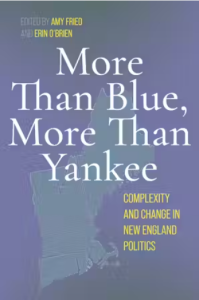New Book From Professor Emerita Amy Fried
Professor Emerita Amy Friend (with Associate Professor Erin O’Brien of UMass-Boston) has edited a forthcoming book entitled More Than Blue, More Than Yankee: Complexity and Change in New England Politics which will be published by University of Massachusetts Press.
This new, edited volume looks at an area of the country that has undergone great changes — New England. It focuses on broad historical shifts in the region, each of the individual New England states and regional dynamics involving women in politics, demographics, political participation and presidential politics. Professor Fried co-authored four of the volume’s 13 chapters.
Today the South is the most Republican area of the country. But when Democrat Franklin D. Roosevelt won in a landslide in 1936, winning all states but two, those were in New England — Maine and Vermont.
Starting in the 1930s, Democratic party leaders from President Roosevelt to Gov. Ed Muskie of Maine made inroads in New England by appealing to immigrants in cities and overlooked rural voters. The Democratic party in Maine was so weak when Muskie ran for governor in 1954, he later observed “We had to talk to Republicans who had never even seen a live Democrat in their lives.”
New England went from two-thirds of its states supporting the Republican candidate for president in 1948 to having Democratic presidential candidates win statewide in every New England state from 2008 through 2020. As Ronald Reagan appealed to the religious right and attracted Southerners to the Republican party, voters in highly secular New England became Democrats.
In 2024, New England has only one House or Senate member who is a Republican — Maine’s Sen. Susan Collins.
And New England is different in another way. Nationally white voters tend to vote Republican. Yet New England has the whitest population in the country and it’s strongly Democratic, especially in presidential and congressional elections.
Yet there are parts of New England that do not vote Democratic and often Democratic elected officials do not fit the progressive mold. Also, many New England states have picked Republican governors, which are typically moderate. Thus it is “more than blue.”
Moreover, the region’s inhabitants and political dynamics don’t fit the image of the laconic Yankee at a town meeting. Politics can be rough and tumble, with pockets of corruption, and states have undergone demographic transformation, in part due to immigration. Thus it is “more than Yankee.”
This book, written to be accessible for a general audience, will be published later in 2024.

